Spider-view: "The Trial of Venom" (Venom, Part 7)
This "special" one-shot can be confounding at moments, despite being fueled by engaging central conflicts between enemies and allies
—by Nathan on October 5, 2024—
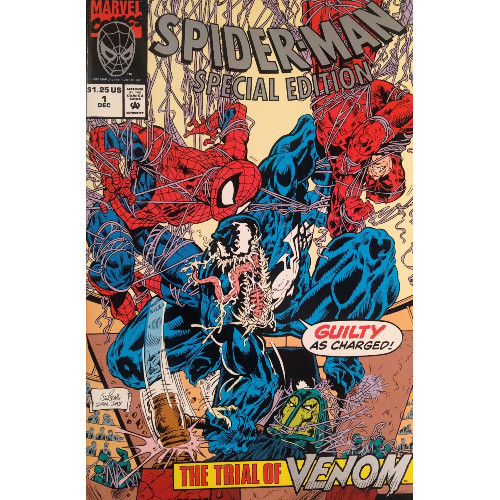
An ad in 1992 Spider-Man issues carried a special announcement: a clarion call to all Spidey fans, the ad presented a new standalone Spider-Man "Special Edition" issue which was "NOT for sale!" as the ad defiantly declared. How then, any Spidey reader of the 90s would then ask, do I get a hold of this "Special Edition" issue? Simple. For a $5.00 donation to the U.S. Committee for the United Nations Children’s Fund (UNICEF), you could own your very own copy of Spider-Man Special Edition #1, complete with a special message from UNICEF, a poster inserted in the issue itself, and a card requesting additional donations.
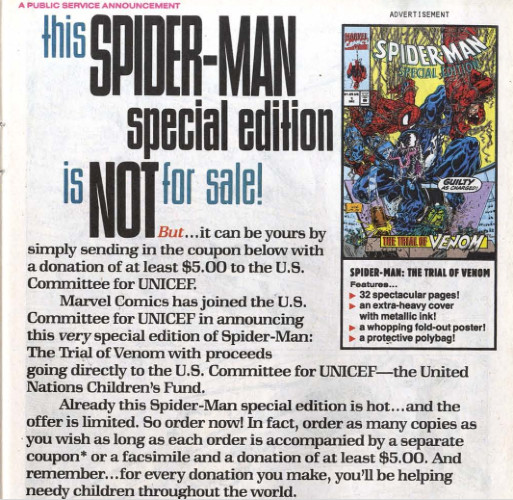
There's a gimmicky quality to the offer, the impact of which is lessened by the narrative itself, which we'll touch on in a bit. I bought the issue second-hand through eBay, and though I don't recall the asking price, it was probably more than $5.00. But I have the special message from UNICEF! And the poster!
(though I'll probably never use the poster because it's stapled inside the issue, and I'd hate to damage either the poster or the issue trying to remove it from the staples)

So, no, I didn't contribute to the United Nations Children's Fund with my purchase, even if I have the special message thanking the initial buyer for their contribution. I didn't even necessarily buy the issue because "Special Edition" is emblazoned on the front or because it was initially developed for a charitable cause. No, I bought the issue because it's a standalone Spider-Man story, and I'm a greedy little vulture not named Adrian Toomes seeking to get my grubby little hands on whatever Spider-Man stories I can grasp.
This "Special" one-shot sees Peter David handle the writing chores on the villain known as Venom a few years before he'd introduce his own version of the slimy symbiote in the pages of Spider-Man 2099. Today, we'll see how this master storyteller handles one of the fiercest members of Spidey's cavalcade of criminals…and one of his best friends.
"The Trial of Venom"
Writer: Peter David
Penciler: Jim Craig
Inkers: Dan Day, David Day
Colorist: Todd Smith
Letterer: Ken Lopez
Issue: Spider-Man Special Edition #1
Publication Date: December 1992
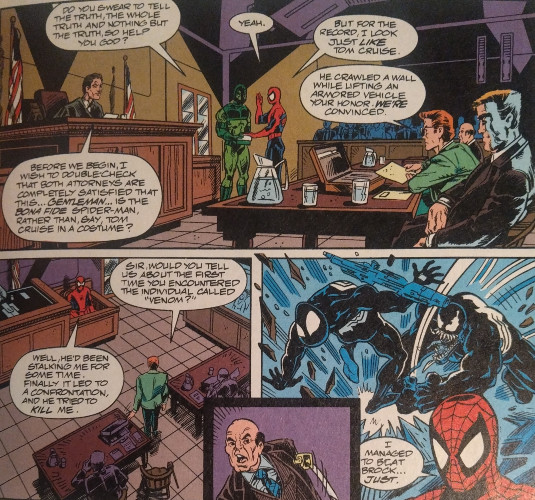
I noted, in my last post, the vagaries of the Venom timeline, how because "Invasion of the Spider-Slayers" ran into January 1993, I inevitably talked about Venom's capture in "Spirits of Venom," which ended in December 1992, after discussing his escape in "Invasion." I entered this one-shot wondering how it would conflate the chronology. The answer: it doesn't? Reference is made early in this issue to the Death Trap: The Vault graphic novel, which saw Venom attempt a breakout at the Vault, but that occurred before this narrative and was published a year-and-a-half prior. That's really the only clue David offers as to "when" this narrative occurs, so we're left in some kinda limbo state (unless I discern clues from other issues I read later) as to our chronology.
David attempts to juggle a couple of different ideas here–the pending trial of Eddie Brock is the main focus of the story, while he inserts a tiny subplot regarding the "death" of the symbiote. In the issue's first few pages, readers are greeted with Eddie Brock in mourning, claiming the symbiote has committed suicide over feeling depressed. Any comic book reader will know immediately this is yet another shady ploy by a shady character, even without 30-plus years of hindsight (I can almost guarantee we wouldn't be getting a Venom trilogy of films if the character bit the dust here and never returned). Characters act warily around Eddie, but I feel like there are moments where they don't regard Brock with the suspicion he genuinely deserves. Folks seem all too willing to accept the goopy guy is gone for good.
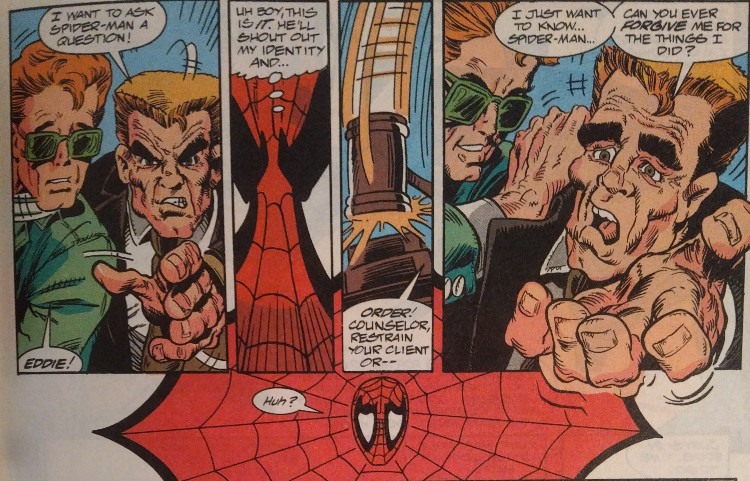
The whole issue is predicated on this "trial" concept, and if David must maneuver a few coincidences into place to make sure we reach that point, he'll do it. Spidey, brought in by Matt Murdock as a "hostile" material witness to Venom, is the most suspicious of Brock's motives, eyebrow permanently raised warily around the villain. I guess these other, largely nameless supporting cast characters must necessarily play the role of patsies to keep our plot moving forward to balance out the deeply distrusting lens through which Spidey views this arch-adversary of his.
The trial itself reads interestingly, even if I'm not sure if it’s accurate to how an actual court of law works. Murdock and Spidey "come to blows," as it were, over Spidey's history with Venom; not only does this familiarize newer readers with their shared past, it examines previous stories through a new lens so longtime fans don't feel like they're just reading a summary. Murdock, fairly adequately, presents a defense based on just how synonymous the symbiote and Brock really are, questioning Spidey's take on his first encounter with Venom. Who's really in charge of the deadly duo? Would Brock, without the symbiote, have weaponized his hatred against Spider-Man? How many of Brock's actions can really be held against him?
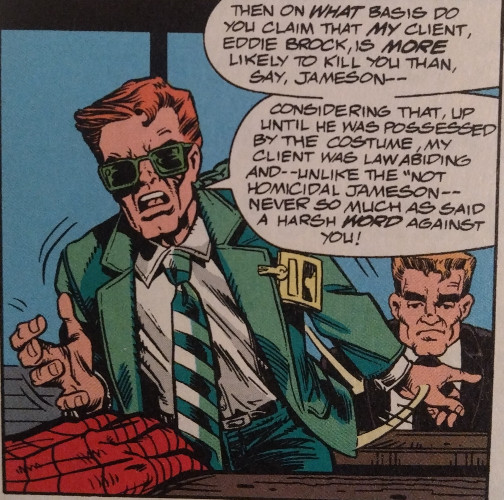
These ideas are worth exploring, and David uses the courtroom scene to draw on notions of justice and criminal instability. Most times, we get Spider-Man thrown into a fracas with the Green Goblin or the Sandman where he punches their lights out and leaves them for the cops. Older comics tend to indicate some vague form of mental illness behind these villainous actions–Lee, at the least, references it each time Osborn slips into his Goblin persona–but they lack the nuance in discussing such matters. David, articulately lays out the argument that, maybe, Brock is more a hostage than a co-conspirator, that without the symbiote, maybe he'd be at peace and refrain from gunning for Spidey's head.
Daredevil appears here and there, but it's Matt Murdock who provides one of the strongest performances. He's in full attorney mode here, representing Eddie Brock to the best of his capabilities. David places him in a slightly antagonistic position: we are 100% Team Spidey and know the pain Venom has inflicted on him in the past, and so when Murdock actively defends his actions, we ourselves may get defensive. What are ya doing with this bum, Matt? we may ask ourselves. Simultaneously, we recognize that Murdock's job isn't to defend only people he likes or agrees with. He must see the world as Brock sees it–or how Brock would like him to see it–and no amount of physical blindness can dissuade him from turning a morally blind eye to someone requiring proper representation.
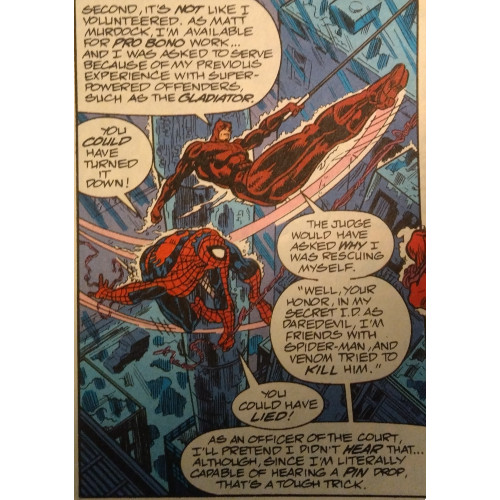
Thus, conflict is created between the spider and the devil, heightened by the fact they've known each other's identities since another Peter David-penned Spidey narrative, "The Death of Jean DeWolff." Spidey's sense of responsibility (in this case, keeping a known murderer and supervillain locked away so he can't harm anyone, specifically Spidey) collides with Daredevil's own sense of responsibility (in this case, fulfilling his obligations as an attorney to represent a client as impartially as possible). They're both right, in a way, or at least can justify their own stances in this matter.
I enjoy David's take on Daredevil, in and out of costume The voice he gives Matt reminds me of how Mark Waid wrote DD, serious but with a hint of mirth in his tone and demeanor. When a woman says she's impressed how easily Matt Murdock can navigate corridors despite being blind, Murdock confidently and humorously replies he's "just doing an impression of a sighted person." David excels at verbal humor like this, and the moment reminds me of a decent joke made by Murdock in "The Death of Jean DeWolff." The way DD and Spidey refer to each other by name also harkens back to David's classic story. Though "The Trial of Venom" is hardly a sequel to DoJDW, I'm glad David got the opportunity to continue working on the Spidey/DD relationship he wrote about in that original tale.
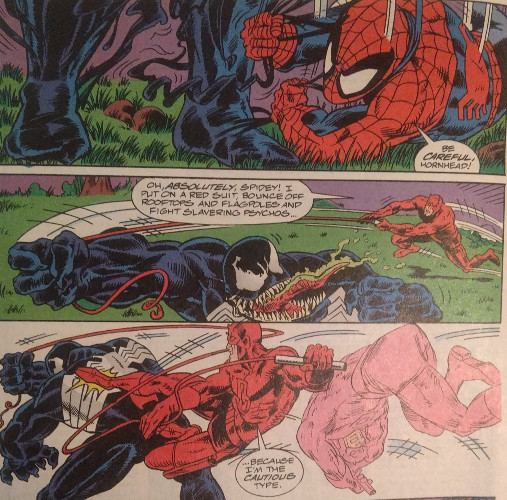
Where the issue stumbles somewhat is how Spidey handles himself outside the courtroom after the final verdict is made. He antagonizes Venom into a fight, revealing the symbiote is alive and well and battling with the baddie once more. The only reason Eddie Brock douses the ruse is because Spidey pushes the right buttons. You'd think a guy so committed to pretending his symbiotic other is dead so he can get out of prison without busting the walls down would stand up against a bit of name-calling. "I just had to push back!" Venom shrieks as he knocks Spidey against a tree. No, you didn't, Brock, but we did need a way to wrap this story up!
Spidey's willful antagonism, I feel, damages the point David makes through Murdock's defense. Yes, everyone reading this should suspect Brock is up to some devious tricks, feigning a change of heart to secure his freedom, so when the moment is revealed, no one need be surprised. But Spidey going against Daredevil's wishes almost immediately after serving as a witness to draw Venom out feels cold. We're not even given a sense that Daredevil asked Spidey to attend as a ploy to fool Venom, nor does Matt seem aware of Spidey's aggressiveness beforehand. Murdock's ideas have merit, but Eddie so quickly resorts to "eat Spider-Man's brains!" mode when pushed even a little that doubt settles. Venom's comeuppance in this issue is deserved, but Spidey as the method of delivering that comeuppance feels stilted and a little rushed.
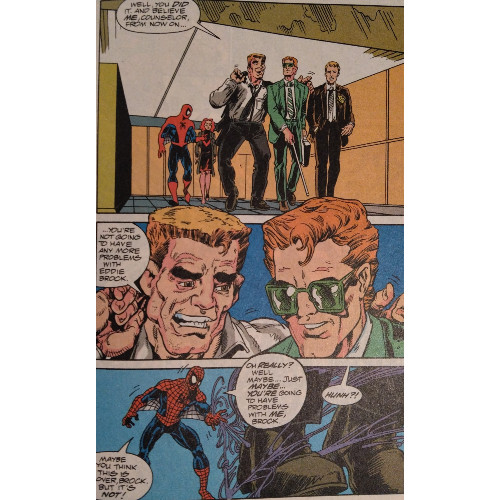
Other parts feel fragmentary, torn between cleverness and awkwardness. The final fight incorporates a piece of technology introduced in the first page which David sneakily weaves into the conclusion. I didn't read that first page and go "Ah, yes, David mentioned this technology because he plans on bringing it back later in the story. Foreshadowing!" It's a clever bit of teasing, the kind I wish appeared elsewhere in the narrative. Unfortunately, this moment comes shortly after a rather confounding scene: during their climactic struggle, Venom looms over a fallen Daredevil and comments that "I blame you for my creation as much as Spider-Man." A head-scratcher of a line to be certain.
If you know your Spidey history, you might think back to DoJDW, wherein a level-headed Daredevil kept a vengeance-crazed Spidey from beating the Sin-Eater to death. From there, you might be able to connect some dots: in his first, full-fledged appearance in ASM #300, Venom revealed his identity as former Daily Globe reporter Eddie Brock and detailed a "heart-breaking" sob story about how an error made during the Sin-Eater debacle cost him his job and led him to blame Spider-Man for his failings, hence the recurring "trying to eat Spider-Man’s brain" sessions. Nowhere in this backtory is DD mentioned, so I can only assume that David, recognizing the link between his Sin-Eater story and Venom's origin, inserted the comment here to capitalize on that bit of history. Since DD was mildly involved in the Sin-Eater debacle, perhaps Venom, in his twisted thinking, sees him as a perpetrator in his own creation? The comment isn't fleshed out, so we're left with a rather bizarre line that doesn't really do anything to justify itself.
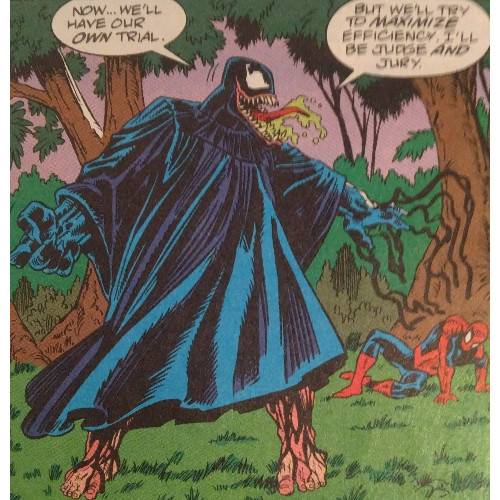
Pieces of Peter David's writing style feel apparent here, particularly in the humorous moments and in the bonds forged and tested between Spider-Man and Daredevil. Hints of an interesting philosophical debate around the nature of supervillains–in a symbiotic relationship such as Edie Brock/the alien, who really is responsible for the crimes Venom commits?–allow an intriguing nation David unpacks well, even if his finale douses it with some cold water by reveling in Venom's viciousness. And, yeah, Spidey's a bit of a dunderhead here, openly discarding Daredevil's warnings to prove that, somehow, his showy antics save the day. It's kinda odd, and I don't necessarily agree that Spidey's pigheadedness should be the tactic which wins him the day. But if it weren't for Brock being the bigger bonehead of the two, I guess we wouldn't get the conclusion both Peters (Parker and David) want, so I guess it works? Nothing like trying to up your arch-foe in the dummy department to prove he's the bigger idiot.